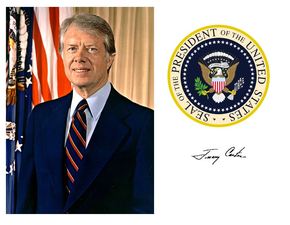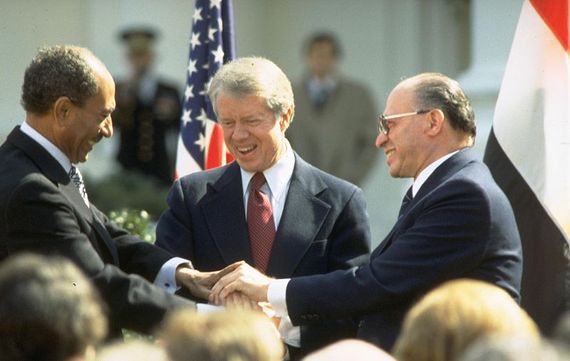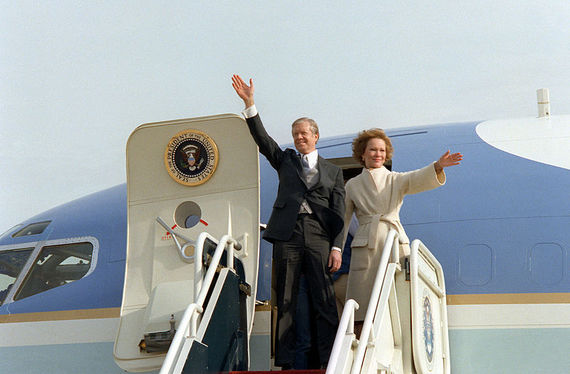
Let me be clear from the outset, I am by no means a Carter apologist. I first entered politics partly because I was unhappy to see Carter win the nomination in 1976 and was a strong Kennedy supporter in 1980. I also will concede that regardless of what I may say on this page, the most important determination on the Carter presidency occurred on November 4, 1980 when voters overwhelmingly decided to change course.
That vote, however, cannot change how consequential the Carter presidency remains today. The only Naval Academy graduate to serve in the White House, President Carter has an enormous foreign policy legacy. He took office after a decade that saw three Arab-Israeli wars and the murder of Israeli athletes at the 1972 Olympics, yet managed to forge a historic agreement at Camp David that, according to at least one Middle East scholar "reshaped the Arab world . . . and in doing so, strengthened immeasurable the U.S. position in the Middle East." More importantly, it fostered a period of relative peace in the region.
(Photo Credit: Tal Shabtai [CC BY-SA 3.0 (http://creativecommons.org/licenses/by-sa/3.0)], via Wikimedia Commons)
Carter also reshaped Latin America, with the Panama Canal Treaty and cut off of military aid to repressive regimes in Argentina and Brazil. In doing so, Carter signaled that the days of Yankee Gunboat Diplomacy was over (at least temporarily).
Carter was the first U.S. president to put human rights at the forefront of foreign policy. Carter's emphasis on human rights and use of the CIA to smuggle in pro-democracy texts into the Soviet bloc played an important role in fostering the anti-Soviet activism that led to the collapse of Soviet control over Eastern Europe.
While Republicans often cite Reagan's military buildup as contributing to the collapse of the Soviet Union, rarely do they mention that it began under President Carter. When the Soviets challenged Carter, he acted forcefully by arming the mujahideen in Afghanistan to give the Soviets their own Vietnam-like catastrophe, proceeding on the MX Missile Program, reinstating draft registration and boycotting the Moscow Olympics.
More importantly, unlike past Presidents who did little to prevent Soviet military action in Hungary and Czechoslovakia, as 27 Soviet and Warsaw Pact divisions amassed on the Polish border ready to invade to crush the nascent Solidarity movement, Carter publicly and privately signaled to the Soviets that there would be "very adverse consequences". These were not mere words, as Carter had a retaliatory strategy in place with key allies that included a plan to immobilized much of the Soviet merchant fleet. Poland's leader later indicated that Carter's actions and the Soviets' difficulties in Afghanistan led to their abandoning invasion plans.
Then there is Iran. The hostage crisis and failed rescue attempt was an albatross that hung over Carter, no more so than on election day which happened to be the first anniversary of the hostage crisis. Carter deserves credit for getting all hostages home safely and would have done so sooner but for an apparent deal that the Reagan campaign had agreed to provide arms to Iran in exchange for delaying the hostages release.
Domestically, Carter had to deal with an economy in a state of shock from two Arab oil embargoes, the release of Nixon-era price controls and the continued decline of manufacturing jobs due to foreign competition. Once again, he did so forcefully with an aggressive energy policy that included establishing the Department of Energy, promoting alternative fuels and the establishing fuel efficiency standards in automobiles. Had subsequent administration's followed his path and continued to increase fuel efficiency standards, we would have stopped importing oil years ago.
His legacy also includes the creation of the Department of Education, expanding Pell Grants to an additional 1.5 million families, airline deregulation which has made air travel more affordable and doubling the size of the National Parks through the addition of 43 million acres in Alaska.
Carter could have achieved far more, including national health care, had he been a better communicator and not antagonized Congressional Democrats. This, along with disarray within his administration, undermined Carter as a leader and was part of what led me to campaign for Ted Kennedy in 1980.
It is curious to see Republicans continue to bash President Carter as a failure when he makes his Republican successors look more like the JV-team. Carter outperformed all of them in job creation and both Bush presidencies in GDP growth, while actually lowering the deficit.
While there is consensus that Carter has been our greatest ex-President, it is time that we also acknowledge in his lifetime what his Presidency achieved and its continued legacy.


